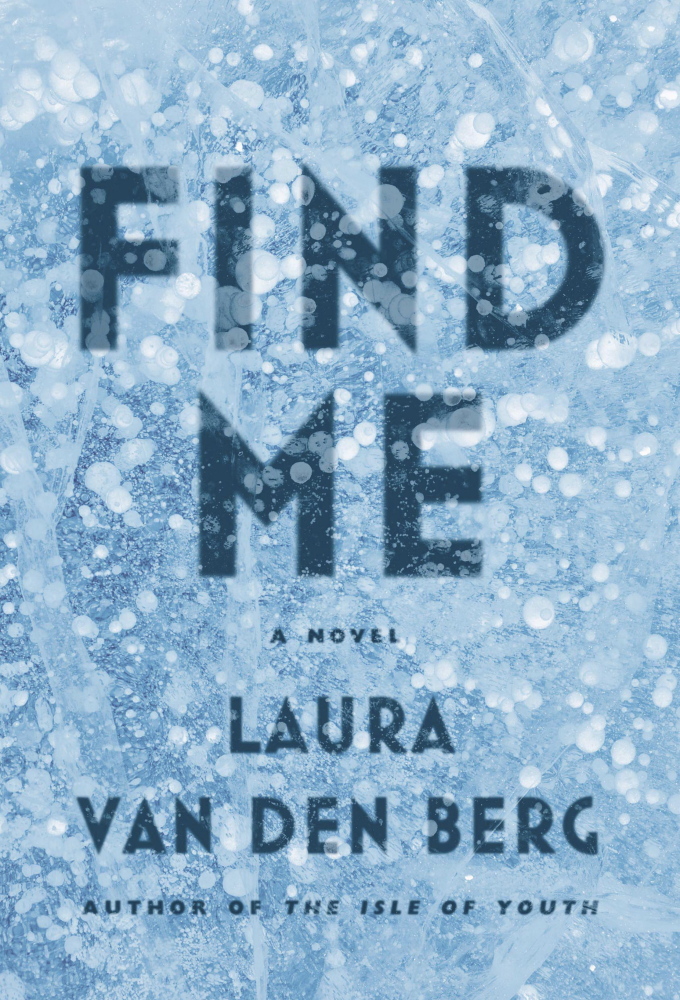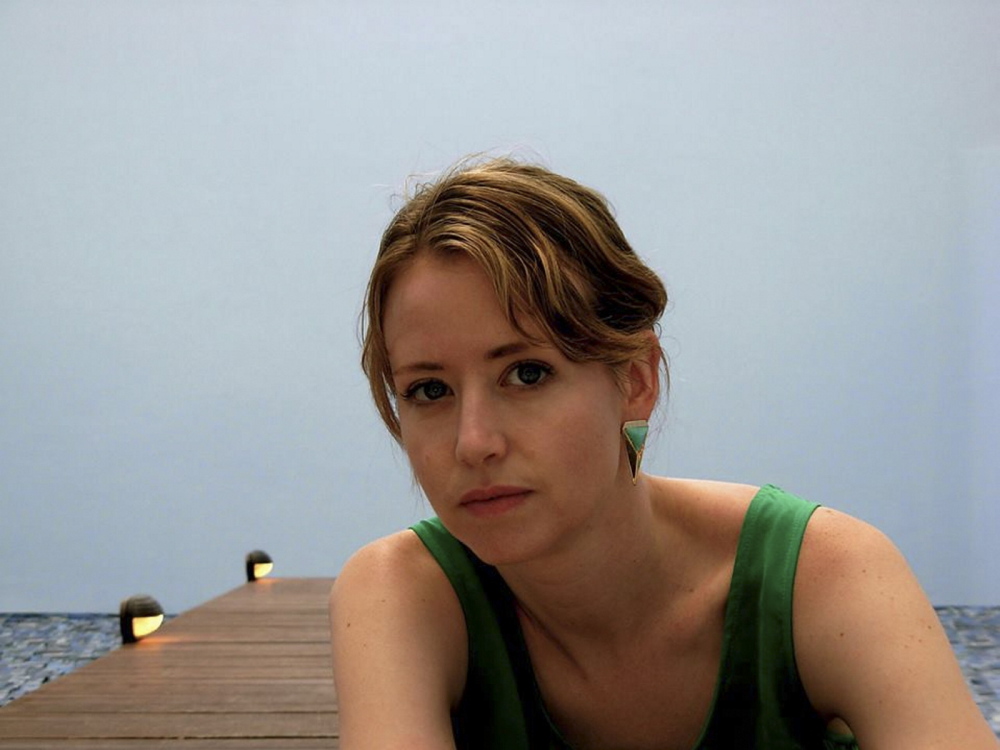Laura van den Berg published her first short story collection at the age of 25 and her second at 29. Since then, she has become somewhat of a critic’s darling, her lean, noirish prose drawing national acclaim. Her first book was a Barnes & Noble “Discover Great New Writers” selection; a story from her second won an O. Henry Prize. Her tale, “Antarctica,” appears in “The Best American Short Stories 2014.” The author has parlayed her success into appointments at some half-dozen schools and colleges. Most recently, she spent a semester at Colby College, where she served as writer-in-residence.
Today, at 31, van den Berg is on the brink of yet another milestone with the arrival of her much-anticipated first novel, “Find Me.” This dystopian tale chronicles a fatal epidemic of memory loss that’s sweeping the nation. At a hospital in Kansas, we meet 19-year-old Joy, one of the few people with immunity, who escapes to Florida in search of the mother who abandoned her.
Van den Berg combines the real and the surreal in her work, which she attributes in part to her Florida origins. “There’s certainly an absurdist quality, a quality of the surreal, to Florida,” she said. “In lots of ways, we’re a very troubled state. Florida, as a place, has definitely informed my sensibility.”
Van den Berg spoke recently from her Boston-area home about novel-writing, landscape, secrets and her former pet wolf. This interview has been edited for length and clarity.
Q: “Find Me” has received lots of terrific press, even months before publication. How do you deal with that kind of anticipation?
A: I know how much blind luck is involved when it comes to getting noticed. For me, the best strategy is to absorb it, be grateful, and then just go back to whatever it is you were doing before – teaching, walking the dog. I absolutely feel celebratory when things are going well, but it’s all ephemeral.
Q: You recently wrote a book review for the New York Times in which you said, “We write in a culture that favors the heft of the novel.” Why is that?
A: You would think, given our short attention span, that a short story would be a perfect medium. Perhaps short stories, like poetry, require less reading time, but you need a lot of space for processing and reflection. I also think that American culture is obsessed with bigness. We love big cars, big houses, big shopping malls. It’s part of our American DNA that if something is bigger, it’s naturally better and more impressive.
Q: Did you feel pressure to expand from short stories into the novel form?
A: A lot of story writers do feel pressure to write a novel. However, that was not the case for me. I started “Find Me” in 2008, took a lot of breaks, worked on-and-off for quite a while. There were moments when I threw the whole thing away and started over. But the thing that stayed consistent throughout was the two-part structure, where one part is set in a hospital, and one part is set in the outside world. I knew intuitively that this was a novel because I could not see its trajectory as a short story. So it was a case of adapting to the kind of story I wanted to tell.
Q: How did it feel creating your own version of dystopia?
A: I wanted to capture that sense of the world just being horribly off-kilter. This is something I’ve been thinking about a lot because much has been written about this big wave of dystopian literature in the last couple of years. Certainly for my generation, there have been many times when the world has just felt crazy. So it’s like nothing we could make up in this dystopian landscape could really outdo our real life.
Q: What are you working on now?
A: When I have a book coming out, I really like to be well into a new project. At the moment, I’m working on a new novel that’s set in Havana, titled “Havana,” and I’m also working on new stories. The new novel is my primary thing, but short story is my first love. It’s always a form that I’ll go back to.
Q: Do you find short stories more satisfying?
A: The process is very different for me. When I finish writing a novel, I feel like I’ve climbed Everest. There’s this deep sense of accomplishment. I find that prolonged immersion in a world to be really satisfying.
But short fiction is much more compatible with everyday living. I can work on a story a little bit in the morning, a little bit in my office at school, a little bit on the subway. I can really write stories in that incremental fashion. I can’t write novels that way. Because the canvas is so large, I sort of have to disappear from my regular life. For example, the most formative work on this book was done at art colonies where I could go someplace and work for 10 hours a day, for 4 to 6 weeks.
Q: The theme of loss keeps coming up in your work. Where does that come from?
A: I can’t trace it back to one formative moment. As a young person, I spent a lot of years feeling really lost, confused, almost unbearably lonely. Even though I’m a vastly happier adult, that well of loneliness is a place that I often return to when I write.
Q: You seem to gravitate toward characters in pain or crisis.
A: Usually, if there’s no trouble, there’s no story. It’s much more exciting when a book just plunges you into the ice cold water, plunges you right into the trouble. You think, “Okay, if this is where it’s starting from, where is this story going to go?”
Q: You’re also very interested in the concept of secrets – whether or when they’re revealed, and who does the revealing.
A: We all have secrets. For some of us, our secrets might be run-of-the-mill; for some of us, our secrets might be damning and ruinous, potentially. But I’m really interested in the burden of secrecy and what it does to a person over time.
Q: You’ve talked about your late start as a reader, that you didn’t read much as a kid.
A: I discovered reading when I was in college. I had never read a short story before. I was encountering authors like Amy Hempel, Edward P. Jones and Charles Baxter. Lorrie Moore was a huge revelation for me.
I grew up in Orlando, in a house that had a zoo-like quality at times. We had dogs, cats, gerbils, fish, chickens. We had a pet wolf for a year. Animals were really some of my best buddies when I was a kid, and that preoccupied a lot of my time.
Q: You’ve lived in a variety of places – Florida, Maryland, Pennsylvania, Boston, Maine. What role has geography played in your writing?
A: As a writer, I am very susceptible to landscape. It really makes an impression on me. For ages, I’ve had an obsession with Antarctica. I think I’m drawn to the extremity of it, perhaps because it’s the opposite of Florida. That was something that I loved about being in Maine, particularly where Colby is. On the highways, you look in your rear-view and there’s just nothing at night. I love that sort of extremity. Antarctica is the ultimate example of that. Because it’s an international research zone, there’s no official government or ruler. What’s enticing for a fiction writer is a sense that anything could happen there.
Q: You mentioned being married to the writer, Paul Yoon. How complicated is it being a two-author couple?
A: We met when we were young and both starting out, so it’s the only way we know. It feels very natural and no more complicated than any relationship. It’s great to have that common language. But also you really need someone who understands what it takes to write a book. So when I say, “I have to go away for six weeks – it’s nothing personal,” it’s wonderful to have someone who understands exactly what that means.
Q: Since you’re both fiction writers, is there a certain competitive aspect?
A: That hasn’t really been an issue for us. Of course, we’re human. We want to be recognized and want our work to be read. But we understand that the most satisfying thing, day in and day out, is the work you do at your desk.
Joan Silverman writes op-eds, essays and book reviews. Her work has appeared in The Christian Science Monitor, Chicago Tribune and Dallas Morning News.
Copy the Story LinkSend questions/comments to the editors.




Success. Please wait for the page to reload. If the page does not reload within 5 seconds, please refresh the page.
Enter your email and password to access comments.
Hi, to comment on stories you must . This profile is in addition to your subscription and website login.
Already have a commenting profile? .
Invalid username/password.
Please check your email to confirm and complete your registration.
Only subscribers are eligible to post comments. Please subscribe or login first for digital access. Here’s why.
Use the form below to reset your password. When you've submitted your account email, we will send an email with a reset code.